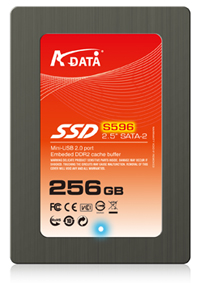
A-DATA, one of the world's largest Flash memory providers, has today announced what it claims to be the industry's fastest solid state drive; its S596 series.
The drive, pictured to the right, is available in 64GB, 128GB and 256GB capacities, and A-DATA quotes sequential read and write speeds of up to 250MB/s and 180MB/s, respectively.
That's quick, but the Taiwanese manufacturer isn't delving into detail - there's no mention of which NAND Flash memory resides within, and no mention of specific controllers. We do know that there's a DDR2 SDRAM cache of unspecified size, but all we've really got to go on is A-DATA's promise that the drive will "perform assorted applications five times faster".
What's interesting is that A-DATA has also equipped the drive with a mini USB port, and it's touting it as the ideal external hard drive for PC enthusiasts.
Rounding off a generally uninformative launch, A-DATA doesn't specify any details on availability or pricing.













